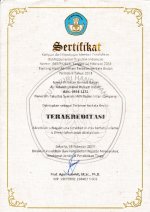Institutionalization of Islamic Law in Indonesia
Abstract
This article discusses the institutionalization of Islamic law into national law in Indonesia. The aim is to analyze the possibility of incorporating Islamic Law into the national legal system. This desire is logical, considering that Muslims in Indonesia occupies the majority position (85%) and the community requires appropriate regulations sourced from the teachings of their religion. Based on the results of the 1979/80 BPHN legal review seminar, there are at least 3 (three) main things that could be done, namely; (1) making Islamic law one of the ingredients in the preparation of national law, (2) reviewing and updating national legal products originating from colonial law that is not following the elements of Islamic law. (3) coordinating new regulations which contain Islamic legal norms. This study finds the fact that not all provisions of Islamic law can be incorporated into national law. Only provisions of a civil nature and which are truly correlated with public order (public interest) can be adopted. Apart from that, the law is not only a legal product but also a political product. In other words, the configuration of legal politics in Indonesia shows a very close relationship with the political realm. Therefore, it is necessary to have a strong synergy between Muslim intellectuals and political actors.
Keywords: Islamic law, legal politics in Indonesia, political configuration.
Full Text:
PDFReferences
A. Qodri Azizy. Eklektisme Hukum Nasional, Kompetisi Antara Hukum Islam dan Hukum Umum. Yogyakarta: Gama Media, 2004.
Bagir Manan. Konvensi Ketatanegaraan. Bandung: Armico, 1987.
Darmansyah. “Mimbar Hukum Islam.” Yayasan Al-Hikmah Bekerjasama dengan Direktorat Pembinaan Peradilan Agama Islam dan Penyelenggaraan Haji Departemen Agama Republik Indonesia, XV 2004.
Hasyim Muzadi. “Islam Rahmatan Lil ‘Alamin, Menuju Keadilan dan Peradaban Dunia, (Perspektif Nahdlatul Ulama).” Dipresentasikan pada Pidato Pengukuhan Doktor Honoris Causa, disampaikan dihadapan Rapat Senat Terbuka IAIN Sunan Ampel Surabaya, IAIN Sunan Ampel Surabaya, Desember 2006.
Ikhtianto. Pengembangan Teori Berlakunya Hukum Islam di Indonesia, dalam Tjun Suryaman (ed), Hukum Islam di Indonesia. 2 ed. Bandung: Remaja Rosdakarya, 1994.
Isa Ansori. “Kedudukan {Fatwa} {Di} {Beberapa} {Negara} {Muslim}.” Analisis 3, no. 1 (Juni 2017).
Jimly Asshiddiqie. Pengantar {IlmuHukum} {Tata} {Negara}. Jakarta: Rajawali Pers, 2010.
Kartini Kartono. Pengantar Metodologi Riset Sosial. Bandung: Mandar Maju, 1990.
Khairuddin dan M. Iwan Sastriawan. Hukum Tata Negara, Pasca Amandemen UUD Negara Republik Indonesia. Jakarta: RajaGrafindo, 2018.
Khotibul Umam. “Legalisasi {Fikih} {Ekonomi} {Perbankan}: {Sinkronisasi} {Peran} {Dewan} {Syariah} {Nasional} dan {Komite} {Perbankan} {Syariah}.” Mimbar Hukum 24, no. 2 (Juni 2012): 360.
Mardani. Hukum Islam Dalam Hukum Positif Indonesia. Jakarta: Raja Wali Pers, 2017.
Ma’ruf Amin. “Solusi {Hukum} {Islam} ({Makharij} {Fiqhiyah}) {Sebagai} {Pendorong} {Arus} {Baru} {Ekonomi} syariah di {Indonesia}.” Malang, Mei 2017.
Muhammad Daud Ali. Hukum Islam : Pengantar Ilmu Hukum dan Tata Hukum Islam di Indonesia. Jakarta: PT. Raja Grafindo Persada, 1996.
Mura P. Hutagalung. Hukum Islam Dalam Era Pembangunan. Jakarta: In Hill Co, 1985.
Siti Mahmudah. “The {Contextualization} of {Sharia} and {Its} {Contribution} to {The} {Development} {Of} {The} {Indonesian} {National} {Law}.” Al-’Adalah 16, no. 1 (t.t.): 2019.
Suhendi, Hendi Hendi, Mohammad Rusfi, N Hidayah, Deni Kamaludin Yusup, Burhanudin Hamnach, Cate Sumner, Khairuddin Khairudin Tahmid, dkk. “Eksistensi ’Urf Sebagai Sumber Pelembagaan Hukum Nasional.” Al-Jami’ah 54, no. 1 (2014): 1000168. https://doi.org/10.24042/adalah.v15i1.3383.
DOI: http://dx.doi.org/10.24042/adalah.v18i1.8362
Refbacks
- There are currently no refbacks.
Copyright (c) 2021 AL-'ADALAH
Al-'Adalah is licensed under a Creative Commons Attribution-ShareAlike 4.0 International License.

1.png)

.png)
_(1).png)
_(1).png)

.png)
